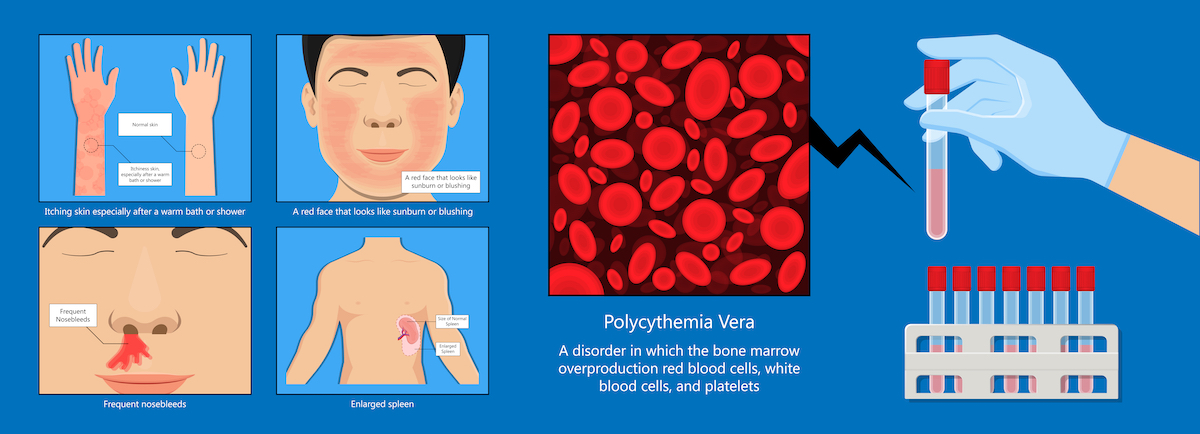As you could read on the previous page, can PV cause secondary conditions? This means that – in this case – too many red blood cells can cause other health problems. Polycythemia vera can cause too much uric acid level in the body, which increases the risk for kidney problems, like kidney stones and gout. Other secondary conditions of having too many red blood cells are splenomegaly, stomach ulcers, and peptic ulcer disease.

Symptoms of Polycythemia Vera
Recognizing PV can be very difficult, as this cancer develops very slowly and sometimes people have no symptoms at all – especially in the first stage of the disease. Which makes it even more difficult to recognize the disease. Nevertheless, symptoms include:
- Headaches
- Dizziness & blurred vision
- Fatigue
- High blood pressure
- Tinnitus
- Excessive sweating (at night)
- Shortness of breath (when laying down)
- Itchy skin (after bath or shower)
- Redness, heat, tingling, or burning in the hands/feet
- Excessive bleeding and/or bruising, like nosebleeds and gum bleeding
- Unexplained weight loss
Treatment Options & Life Expectancy
After recognizing the symptoms, it’s important to visit your professional healthcare provider. He or she will listen to your concerns and start testing you. This consists of blood tests, bone marrow biopsies, and/or molecular testing. Once the correct diagnosis has been made, and it is indeed PV, there are the following treatment options:
- Phlebotomy to reduce the overall blood volume
- Low-dose aspirin to reduce the risk of blood clotting
- Medication to reduce the red blood cell count
- Medication to reduce the itching
- Phototherapy to reduce the itching
- Bone marrow transplantation
Polycythemia vera usually isn’t fatal. The risk comes from complications of blood clotting, or from the very small chance that it would progress to a more aggressive type of blood cancer, like acute leukemia. Complications of PV are blood clotting which can lead to heart failure and/or strokes, which can result in death. There is no cure for PV, but with the right treatment, recent studies estimate that the life expectancy after being diagnosed with polycythemia vera is approximately 20 years.
There are so many ways to treat cancer these days, the above-mentioned are just a few examples. Sometimes they are combined, but it can also happen that these treatments do not help (anymore), so other options should be sought. That’s why it’s very important to do your own extensive online research and stay up to date about new treatments. Have you already been diagnosed with polycythemia vera or another type of blood cancer, but aren’t satisfied with your treatment plan? It’s always a good idea to do a second opinion in another hospital or oncology center. Start your search today:

